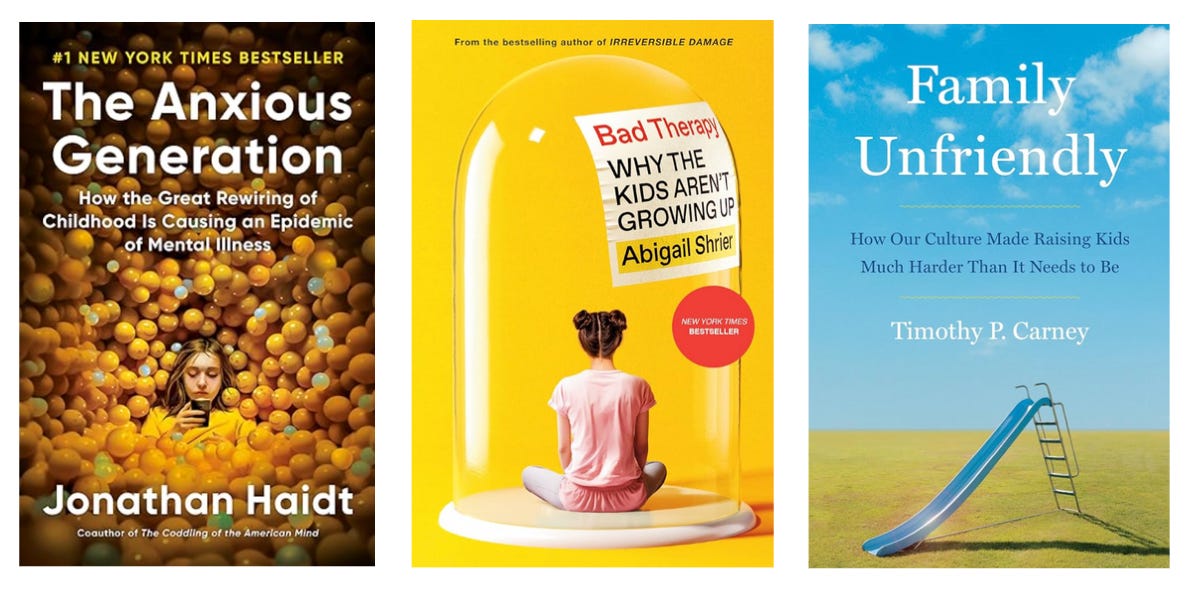Save the Children From This Digital Existence
It's past time to get dead serious about this.
I just read the most important book this year — perhaps this decade or beyond. It almost feels like our societal fate depends on taking the advice within it.
Jonathan Haidt’s The Anxious Generation nailed it. Along with Bad Therapy by Abigail Shrier and Family Unfriendly by Tim Carney, these are the trifecta of books to grab right now.
The previous books by all three of these authors created a raving superfan in me and also launched a dozen of my own ideas, which I’ve put into freelance pieces over the years.
Fun fact: Carney’s book, Alienated America, is where I first saw the statistic that women who attend church weekly are 5x less likely to commit suicide — which led me to a barrage of other research and ultimately to write my own research-driven book, Reason to Return.
But I digress…here’s why I’m so hot for these concepts right now:
What’s So Important About These Books?
All touch on some of these concepts, though I’m focusing primarily on the Anxious Generation:
Mental health in teens began to nosedive in 2012, just after the iphone became universal. Not just in America, but literally around the world. The stats and charts in the book are…so depressing on this.
Smartphones and ipads are what Haidt calls “experience blockers” — where teens are immersed in the blackhole of their screens and wholly inactive in the real world.
70% of schools say they don’t allow phones, but that’s only “in class” which means a kid can have a phone in their pocket or backpack. They can secretly watch or listen and certainly they go right to it in between classes and at lunch.
Kids have lost independence and freedom and we need to get it back. For example, “helicopter parenting” has gotten worse because parents CAN track where their kids are. So, we do — increasing parental fears and child dependence. If we gave kids more freedom and responsibility, they’d be empowered.
Laws on internet usage and the creation of social media accounts have not changed since 1998 — and 13 is the “age of consent.” Of course, even that is not really enforced, and children are walking around with the entire Internet in their backpacks thanks to elementary schools requiring iPads.
Central theme: Overprotection in the real world, under-protection in the virtual world.
Depression, anxiety, suicide, self-harm, loneliness, rise in transgender identification, and “failure to launch” are all effects of this digital downfall.
Kids are making fewer friends, interacting in person far less, and are haunted and cursed by social media popularity (or otherwise).
They are scared, timid, angry, and living in a constant disembodied reality.
Though COVID certainly made everything worse, it all began long before that. Haidt’s research traces it back to the universal use of the smartphone. Nothing else can explain the worldwide downfall of teens in the Western world.
It’s abundantly clear that we need to ditch the smartphones for teens. This formative time of life, as pre-teens, in puberty and just after, shapes their brains for a lifetime.
Think of it this way:
…If you write your name in concrete when very wet, it doesn’t stay.
…If you try to write your name in concrete when it’s fully dry, it doesn’t show up.
…If you try to write your name in concrete when it’s almost dry, it stays forever.
That’s how we can think of adolescent brains. When they’re formed around screens, solitude, fear, judgment, and a false narrative of reality, they are corrupted.
It can alter the brain space in a devastating way, leading to the devastating rates of mental health we now see in high school, college, and beyond.
Simultaneously, other harmful things have happened:
Families are smaller and more dispersed (less connection & support)
Organized sports have taken over kids’ lives (with little room for random play)
Faith has been lost, leaving people to long for identity.
There are less “third places,” where people gather unofficially in community
Overuse of the concept of trauma (everything is now trauma) and the idea of “safety” from ideas
Unnecessary diagnoses and therapy that are actually harmful in cultivating “issues” that might have been solved naturally without obsessing over them.
These are just a few of the topics these books covered, but it’s worth our time to really ingest this and start making drastic changes.
The good news? Most of it is totally FREE. A collection of solutions:
No smartphones or social media until 16
More free play
More freedom and independence for kids
No smartphones allowed in school (like locked up, not accessible!)
Less organized sports, more unofficial gatherings
Revitalize faith communities
Have more kids and bring more trusted adults into your kids’ lives
Stop “criminalizing” freedom (examples like a mother being arrested for leaving her 11-year-old at home alone!)
More family-positive policies
Cities created with children in mind (more walking, biking — less highways, etc.)
Screens are easy, but starting your toddler on iPad cartoons is a bad idea. It’s one thing to watch TV; it’s another to carry it around with you all day with portals to another world (as teens do.) I cringe every time I see a toddler on a device in public (caveat: yes, I realize sometimes this can be a necessary moment, relax, I’m not saying you’re a bad parent if you’ve ever done this.)
Kind of reminds me of this terrible new commercial for the new iPad. When we do this to kids, we crush all the beautiful, creative and embodied things of the world into nothing but a flat, dead screen:
We must be able to escape from the fake world of the Internet, social media, video games, and endless information. Even my kid says, “Let’s Google it,” all the time. It makes us lose any sense of mystery or imagination.
Remember when we could watch a movie at home without Googling every actor’s film history, romantic relationship, scandal or untimely demise? I’m not sure why it’s so “bad” to do that, but it doesn’t feel “good” when I do for some reason.
So many of us say, “I’m so glad iPhones and social media” weren’t around when I was a kid. I can’t imagine the mental toll it would have on me.
Facebook only came to be when I was in my last year of college. And given how I enjoy social media now, I know it would have been bad news for me then.
…Constantly perfecting and filtering photos
…Feeling left out by the parties I wasn’t invited to
…Stalking my crush’s every move and obsessing over it
…Making assumptions and telling myself stories that weren’t true based on social media
…Diving into my phone when depression, anxiety or discomfort hit.
The kids reeling from the consequences of our digital existence can’t even get the help they need. A friend of mine has a son dealing with some difficult mental health problems, but he can’t get into the specialist he needs for 18 MONTHS because they are so full of child patients.
A nurse friend of mine said it’s like that everywhere because these specialized practices and facilities were designed for a smaller number of patients…because kids didn’t use to have all these mental health problems.
How this all morphs into their adulthood and the leadership that is provided in this country, the communities and societies. that develop in light of it…is rather scary.
As for me, I’m taking it very seriously and doing the following:
Opting into Let Grow (Haidt’s really incredible organization!) + doing their independence challenges with my kids
Eliminating iPads. Our iPads will be gone in two weeks when school ends. Then the kids start at their new school, which doesn’t allow ANY devices (yessss!).
Focusing on creating independence milestones for my kids
Creating as many unofficial play gatherings as I can
Letting them experience disappointment and struggle to build up their “human” muscles
No devices of any kind in the car or at restaurants
Absolutely no smartphones or social media until 16 min.
I will probably get Gab watches (no internet) to communicate with them in a couple of years
I’d like them to go to sleep away camp + get used to being independent from us
As many conversations as possible about critical thinking, logic, healthy debate, history, and all the things (also missing from childhood these days…)
I hope everyone will read these books and take them to heart. We can change the future if we lean in on this stuff.
Also, I write books! If you haven’t grabbed a copy yet, now’s the time:
The best way to support this newsletter and my ministry to draw women back to faith community is to buy a copy, share, and leave a review on Amazon + Goodreads!
Reason to Return: Why Women Need the Church & the Church Needs Women
Leaving Cloud 9: The True Story of a Life Resurrected From the Ashes of Poverty, Trauma and Mental Illness





https://www.elevateyouthvt.org/blog/first-in-the-nation-vermont-youth-nonprofit-quits-meta-to-protect-teens